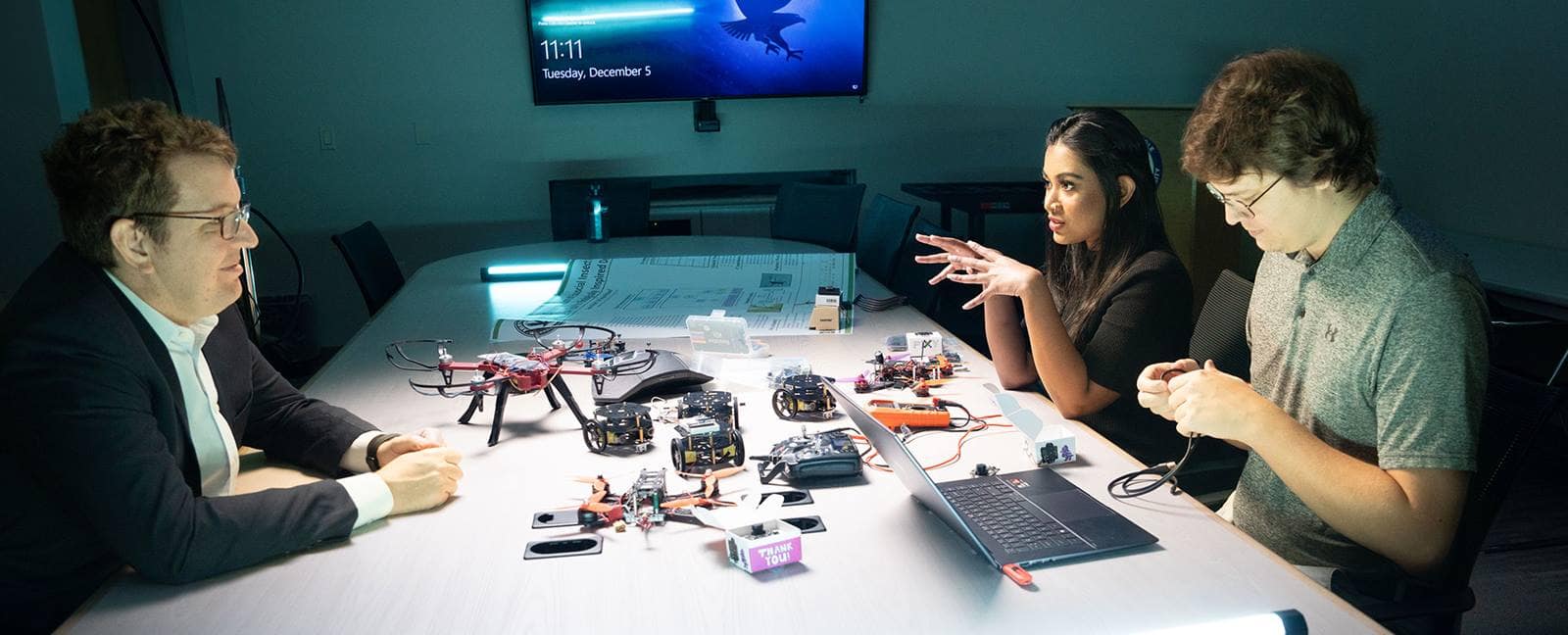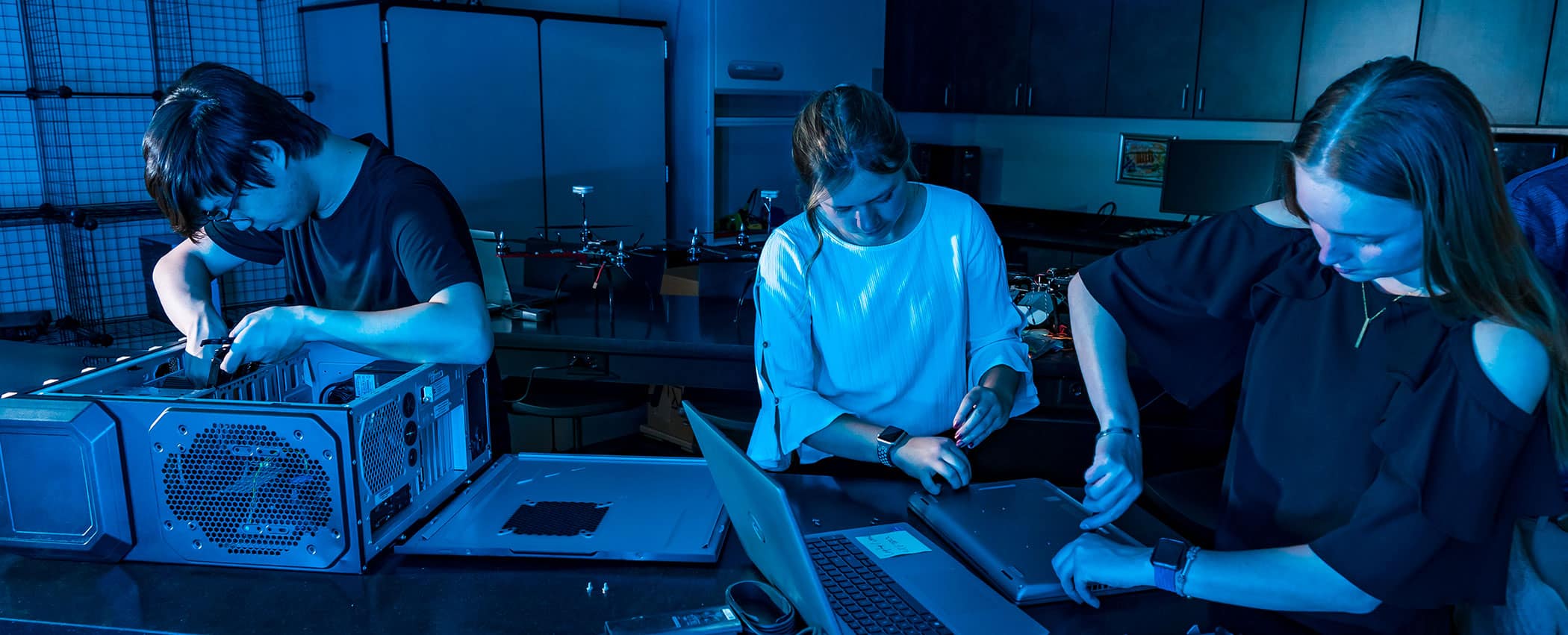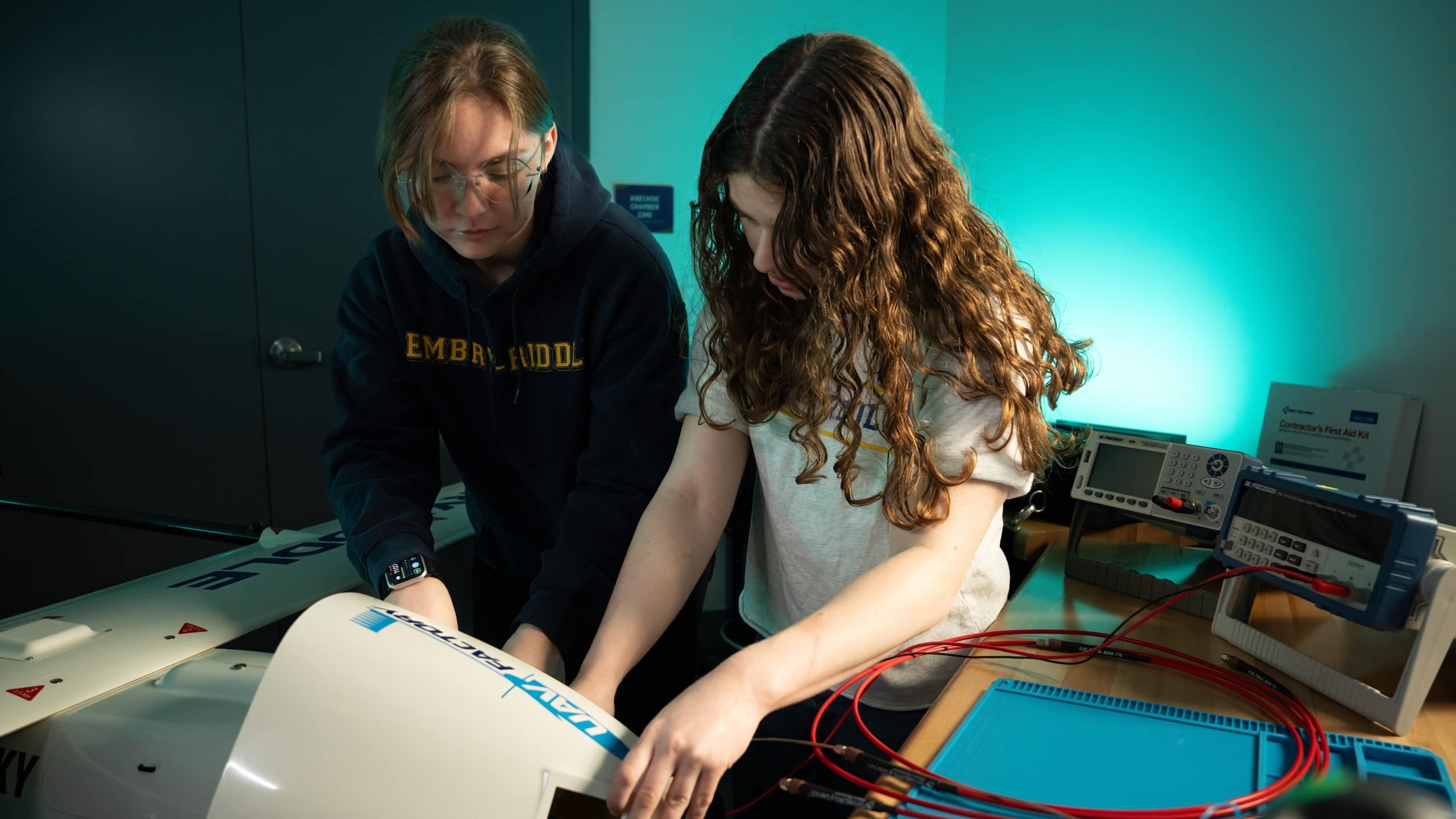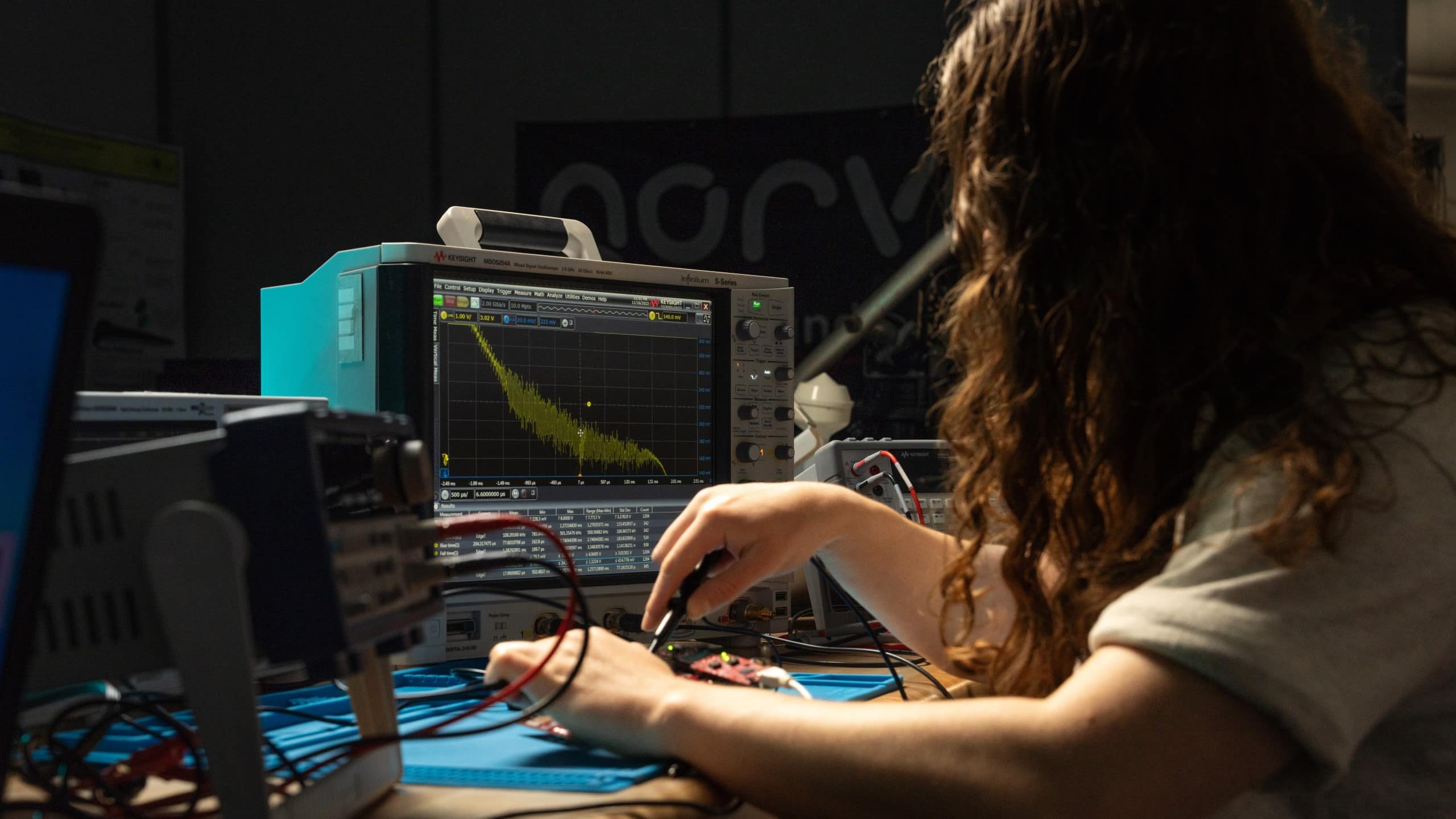
Bachelor of Science in
Computer Science
The Bachelor of Science in Computer Science blends theory and application for computer science and software engineering positions.
About the Bachelor of Science in Computer Science
The Bachelor of Science in Computer Science program at Embry‑Riddle prepares students to emerge with a solid foundation in computer science basics, advanced computer science topics and software programming practices.
According to the U.S. Bureau of Labor Statistics, positions in computer science are expected to grow by 23% through 2032. Computer Science students benefit from the high-tech atmosphere, featuring state-of-the-art computer facilities, team software development and real-time hardware laboratories.
While earning a computer science degree, you will have the opportunity to:
- Analyze a complex computing problem and apply principles of computing and other relevant disciplines to identify solutions.
- Design, implement and evaluate a computing-based solution to meet a given set of computing requirements in the context of the program’s discipline.
- Communicate effectively in a variety of professional contexts.
- Recognize professional responsibilities and make informed judgments in computing practice based on legal and ethical principles.
- Function effectively as a member or leader of a team engaged in activities appropriate to the program’s discipline.
- Apply computer science theory and software development fundamentals to produce computing-based solutions.
Computer Science Career Opportunities
Careers and Employers
With a high placement rate of 100% within six months of graduation, Embry-Riddle Computer Science graduates are set to enter the workforce in various positions, including programmer analysts, cybersecurity analysts, software engineers and model-based systems engineers.
Students earning a degree in computer science often accept employment offers from top companies such as Collins Aerospace, Darden, Microsoft, Lockheed Martin, The Boeing Company, Garmin and Caci International.
Computer Science Salary Information
Receiving a degree in computer science from Embry-Riddle provides the opportunity for competitive salaries, averaging $136,620 annually as of 2022.
DETAILS
About Computer Science at the Daytona Beach, FL Campus
Part of the Electrical Engineering and Computer Science Department of the College of Engineering, the Bachelor of Science in Computer Science blends theory, applications, algorithms and data structures to prepare students for many different commercial or government computer science and software development positions.
The program simultaneously lays a foundation for graduate studies in computer science or software programming while placing an emphasis on interacting with other disciplines, just like real-world engineers.
Tracks/Specialties and/or Certificates
Students pursuing a computer science degree have the option to complete one of the following two tracks:
- Standard Track
- Cybersecurity Engineering Track
Computer Science Information
- Credits: 120
- Online or In-Person: In-Person
Professional Accreditation
The Bachelor of Science in Computer Science program is accredited by the Computing Accreditation Commission of ABET under the General Criteria and Program Criteria for Computer Science and Similarly Named Computing Programs.
Details about Program Educational Outcomes, Student Learning Outcomes, and Enrollment Data can be found on our Computer Science Program Accreditation Information page.
Helpful Links
- Tour Our Daytona Beach Campus
- Discover the Department’s Faculty
- Explore the Fields of Study: Engineering; Computers & Technology; and Applied Science
- Find Related Clubs & Organizations
Student Learning Outcomes
Students will:
- Analyze complex computing problems and apply principles of computing and other relevant disciplines to identify solutions.
- Design, implement, and evaluate computing-based solutions to meet specific computing requirements within their program’s discipline.
- Communicate effectively in various professional contexts.
- Recognize professional responsibilities and make informed judgments in computing practice based on legal and ethical principles.
- Function effectively as members or leaders of teams engaged in activities appropriate to their program’s discipline.
- Apply computer science theory and software development fundamentals to produce computing-based solutions.
General Education Requirements
For a full description of Embry-Riddle General Education guidelines, please see the General Education section of this catalog. These minimum requirements are applicable to all degree programs.
| Communication Theory & Skills (COM 122, COM 219, COM 221) | 9 | |
| Lower-Level Humanities | 3 | |
| Lower-Level Social Sciences | 3 | |
| Lower or Upper-Level Humanities or Social Sciences | 3 | |
| Upper-Level Humanities or Social Sciences | 3 | |
| Computer Science (CS 223) | 3 | |
| Mathematics (MA 241 & MA 242) | 8 | |
| Physical and Life Sciences 1 | 7 | |
| Total Credits | 39 | |
Computer Science Core
| Professional Preparation | ||
| EGR 101 | Introduction to Engineering | 2 |
| UNIV 101 | College Success | 1 |
| Mathematics | ||
| MA 412 | Probability and Statistics | 3 |
| Computer Engineering | ||
| CEC 220 | Digital Circuit Design | 3 |
| CEC 222 | Digital Circuit Design Laboratory | 1 |
| CEC 320 | Microprocessor Systems | 3 |
| CEC 322 | Microprocessor Systems Laboratory | 1 |
| CEC 470 | Computer Architecture | 3 |
| Computer Science | ||
| CS 222 | Introduction to Discrete Structures | 3 |
| CS 225 | Computer Science II | 4 |
| CS 225L | Computer Science II Laboratory | 0 |
| CS 303 | Cryptography and Network Security | 3 |
| CS 315 | Data Structures and Analysis of Algorithms | 3 |
| CS 317 | Files and Database Systems | 3 |
| CS 332 | Organization of Programming Languages | 3 |
| CS 344 | C Programming and UNIX | 3 |
| CS 362 | Computing Theory | 3 |
| CS 420 | Operating Systems | 3 |
| CS 432 | Information and Computer Security | 3 |
| CS 462 | Computer Networks | 3 |
| CS 490 | Computer Science Capstone Design I | 3 |
| CS 491 | Computer Science Capstone Design II | 3 |
| Software Engineering | ||
| SE 300 | Software Engineering Practices | 3 |
| Total Credits | 60 | |
Standard Track
| Computer Science | ||
| CS 455 | Artificial Intelligence | 3 |
| Required Electives | ||
| Open Elective | 9 | |
| Specified Electives 2 | 9 | |
| Total Credits | 21 | |
Cybersecurity Engineering AOC
| Computer Science | ||
| CS 426 | Digital Forensics | 3 |
| CS 427 | System Exploitation and Penetration Testing | 3 |
| CS 428 | Applied Cryptography | 3 |
| Cybersecurity | ||
| CYB 155 | Foundations of Information Security | 3 |
| CYB 465 | Cybercrime and Cyberlaw | 3 |
| Required Electives | ||
| Technical Electives 3 | 6 | |
| Total Credits | 21 | |
| Total Degree Credits | 120 | |
- 1
To satisfy the seven (7) credit hours requirement, choose one course from the following list:
- CHM 111, GEO 215, WX 201, PS 150, PS 227
And one course from the following courses plus lab combinations:
- BIO 120 and 120L, or CHM 110 and 110L, or PS 224 and PS 224L, or PS 226 and 226L, or PS 250 and PS 253
- 2
Courses to be selected, with the approval of the program coordinator, to support acquiring a minor, an identified concentration of domain knowledge (aerospace, aviation, business, communications, human factors, mathematics, etc.), or further depth in computer science or related disciplines.
- 3
CEC/CS/EE/SE/SYS Upper-Level Elective, with approval from the Program Coordinator.
Suggested Plan of Study - Cybersecurity Engineering AOC
Students should be aware that several courses in each academic year may have prerequisites and/or corequisites (check the course descriptions before registering for classes to ensure requisite sequencing).
See the Common Year One outline in the Engineering Fundamentals Program Introduction.
| Year One | ||
|---|---|---|
| Credits | ||
| See the Common Year One outline in the College of Engineering introduction. | 33 | |
| Credits Subtotal | 33.0 | |
| Year Two | ||
| CEC 220 | Digital Circuit Design | 3 |
| CEC 222 | Digital Circuit Design Laboratory | 1 |
| HU/SS Lower Level | 3 | |
| COM 219 | Speech | 3 |
| SE 300 | Software Engineering Practices (with Lab) | 3 |
| CYB 155 | Foundations of Information Security | 3 |
| CEC 320 | Microprocessor Systems | 3 |
| CEC 322 | Microprocessor Systems Laboratory | 1 |
| COM 221 | Technical Report Writing | 3 |
| CS 344 | C Programming and UNIX | 3 |
| Physical and Life Sciences * | 4 | |
| Credits Subtotal | 30.0 | |
| Year Three | ||
| CS 362 | Computing Theory | 3 |
| CS 315 | Data Structures and Analysis of Algorithms | 3 |
| CS 332 | Organization of Programming Languages | 3 |
| CS 420 | Operating Systems | 3 |
| MA 412 | Probability and Statistics | 3 |
| Humanities or Social Science Upper Level Elective | 3 | |
| CS 303 | Cryptography and Network Security | 3 |
| CS 317 | Files and Database Systems | 3 |
| CYB 465 | Cybercrime and Cyberlaw | 3 |
| Technical Elective ** | 3 | |
| Credits Subtotal | 30.0 | |
| Year Four | ||
| CEC 470 | Computer Architecture | 3 |
| CS 462 | Computer Networks | 3 |
| CS 426 | Digital Forensics | 3 |
| CS 490 | Computer Science Capstone Design I | 3 |
| CS 432 | Information and Computer Security | 3 |
| CS 427 | System Exploitation and Penetration Testing | 3 |
| CS 491 | Computer Science Capstone Design II | 3 |
| CS 428 | Applied Cryptography | 3 |
| Technical Elective ** | 3 | |
| Credits Subtotal | 27.0 | |
| Credits Total: | 120 | |
- *
Select one lecture course and one lab combination from the following list: BIO 120 and 120L, or CHM 110 and 110L, or PS 224 and PS 224L, or PS 226 and 226L, or PS 250 and PS 253.
- **
CEC/CS/EE/SE/SYS Upper-Level Elective, with approval from program coordinator.
Suggested Plan of Study - Standard Program Requirements
Students should be aware that several courses in each academic year may have prerequisites and/or corequisites (check the course descriptions before registering for classes to ensure requisite sequencing).
See the Common Year One outline in the Engineering Fundamentals Program Introduction.
| Year One | ||
|---|---|---|
| Credits | ||
| See the Common Year One outline in the College of Engineering introduction. | 33 | |
| Credits Subtotal | 33.0 | |
| Year Two | ||
| CEC 220 | Digital Circuit Design | 3 |
| CEC 222 | Digital Circuit Design Laboratory | 1 |
| HU/SS Lower Level | 3 | |
| COM 219 | Speech | 3 |
| SE 300 | Software Engineering Practices (with Lab) | 3 |
| MA 412 | Probability and Statistics | 3 |
| CEC 320 | Microprocessor Systems | 3 |
| CEC 322 | Microprocessor Systems Laboratory | 1 |
| COM 221 | Technical Report Writing | 3 |
| CS 344 | C Programming and UNIX | 3 |
| Physical and Life Sciences * | 4 | |
| Credits Subtotal | 30.0 | |
| Year Three | ||
| CS 362 | Computing Theory | 3 |
| CS 315 | Data Structures and Analysis of Algorithms | 3 |
| CS 332 | Organization of Programming Languages | 3 |
| CS 420 | Operating Systems | 3 |
| HU/SS 300/400 Level | 3 | |
| Open Elective | 6 | |
| CS 303 | Cryptography and Network Security | 3 |
| CS 317 | Files and Database Systems | 3 |
| CS 455 | Artificial Intelligence | 3 |
| Credits Subtotal | 30.0 | |
| Year Four | ||
| CEC 470 | Computer Architecture | 3 |
| CS 462 | Computer Networks | 3 |
| Specified Electives ** | 9 | |
| CS 490 | Computer Science Capstone Design I | 3 |
| CS 432 | Information and Computer Security | 3 |
| Open Elective | 3 | |
| CS 491 | Computer Science Capstone Design II | 3 |
| Credits Subtotal | 27.0 | |
| Credits Total: | 120 | |
- *
Select one lecture course and one lab combination from the following list: BIO 120 and 120L, or CHM 110 and 110L, or PS 224 and PS 224L, or PS 226 and 226L, or PS 250 and PS 253.
- **
Courses to be selected, with the approval of the program coordinator, to support acquiring a minor, an identified concentration of domain knowledge (aerospace, aviation, business, communications, human factors, mathematics, etc.), or further depth in computer science or related disciplines.
Get Started Now:
Summary
120 Credits
Estimate your tuition by using the Tuition Calculator
View Financial Aid Information
Learn about our General Education
Find out about transferring credits to this degree
Learn more about our Veterans & Military benefits
View our Academic Calendar




